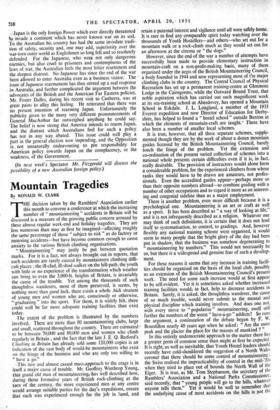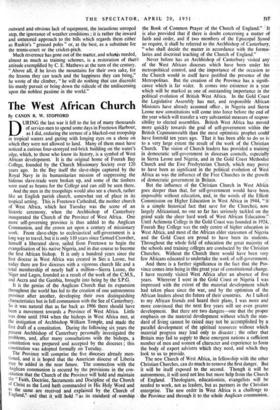Mountain Tragedies
By RONALD W. CLARK THE decision taken by the Ramblers' Ass,ociation earlier this month to convene a conference at which the increasing number of " mountaineering " accidents in Britain will be discussed is a measure of the growing public concern aroused by these almost regular week-end and holiday tragedies. They are less numerous than may at first be imagined—affecting roughly the same percentage of those " subject to risk " as do factory or motoring accidents—but have become common enough to cause anxiety to the various British climbing organisations. " Mountaineering " may justly be put between quotation marks. For it is a fact, not always brought out•in reports, that such accidents are rarely caused by mountaineers climbing diffi- cult places ; the ill-clad. ill-shod walker on the hill-path, the youth with little or no experience of the transformation which weather can bring to, even the 3,000-ft. heights of Britain, is invariably the cause of the trouble. Yet among the thousands of such thoughtless wanderers, most of them preserved, it seems, by nothing more than good luck, there exists a whole .hick stratum of young men and women who are, consciously or otherwise, "graduating " into the sport. For them, it is widely felt, there could well be far more adequate training facilities than exist today. The extent of the problem is illustrated by the numbers involved. There are more than 80 mountaineering clubs, large and small, scattered throughout the country. There are estimated • to be between 70,000 and 80,000 men and women who climb regularly in Britain ; and the fact that the late J. E. Q. Barford's Climbing in Britain has already sold some 120,000 copies is an indication of the vast body of would-be mountaineers who exist on the fringe of the business and who are only too willing to " have a go." .
This new and almost casual mass-approach to the crags is in itself a major cause of trouble. Mr. Geoffrey Winthrop Young, that grand old man of mountaineering; has well described how, during those formative years of British rock-climbing at the turn of the century, the more experienced men at any centre would arrange suitable parties for the day's expeditions, ensure that each was experienced enough for the job in hand, and retain a-paternal interest and vigilance until all were safely-home.. It is rare to find any comparable spirit today watching over the thousands of Youth Hostellers—and others—who set out for a mountain walk or a rock-climb much as they would set out for an afternoon at the cinema or " the dogs."
However, since the end•of the war a number of attempts have successfully been made to provide elementary instruction in mountain-craft on a non-profit-making basis, many of them organised under the aegis of the British Mountaineering Council, a body founded in 1944 and now representing most of the major climbing clubs in the country. The Central Council of Physical Recreation has set up a permanent training-centre at Glenmore Lodge in the Cairngorms,'while the Outward Bound Trust, that noble aspiration which has carried out such magnificent work at its sea-training school at Aberdovey, has opened a Mountain School in Eskdale. J. L. Longland,. a member of the 1933 Everest expedition and now Director of Education for Derby- shire, has helped to found a " hostel school " outside Buxton at which the elements of mountain-craft are taught.• There have also been a number of smaller local schemes.
It is true, however, that all these separate schemes, supple- mented though they are by the work of abouta dozen mountain guides licensed by the British Mountaineering Council, barely touch the fringe of the problem. Yet the extension and co-ordination of the present varied collection of schemes into a national whole presents certain difficulties even if it is, in fact, really desirable. The provision of instructors would alone form a considerable problem, for the experienced climbers from whose ranks they would have to be drawn are amateurs, not profes- sionals. Even the accredited guides appear—perhaps more so than their opposite numbers abroad—to combine guiding with a number of other occupations and to regard it more as an interest- . ing and congenial sideline than as a major employment.
There is another problem, even more difficult because it is a psychological one. Mountaineering is an art or craft as well as a sport. It has been described as "a way of looking at life," and it is not infrequently described as a religion. Whatever one may think of such definitions, it is certain that it does not lend itself to systematisation. to, control, to gradings. And, however flexibly any national training scheme were organised, it would seem to many people that the bright glory of the day had been put in shadow, that the business was somehow degenerating to mountaineering by numbers." This would not necessarily be so, but there is a widespread and genuine fear of such a develop- ment.
For these reasons it seems that any increase in training facili- ties should be organised on the basis of the local club, possibly as an extension of the British Mountaineering Council's present work. The need for some such increase would at first appear to be self-evident. Yet it is sometimes asked whether increased training facilities wouldi in fact, help to decrease accidents in Britain. Surely, it is asked, the thoughtless wanderer, the cause of so much trouble, would never submit to the mental and physical discipline which training involves. And does one not. with every move to " popularise " mountaineering, swell still further the numbers of the worst " have-a-go " addicts? So runs the argument, a continuation of the debate begun by F. W. Bourdillon nearly 40 years ago when he asked: " Are the snow peak and the glacier the place for the masses of mankind ? " In this entirely undemocratic approach to the matter there lies a greater germ of common sense than might at first be expected. It is right, as well as inevitable, that Youth Hostel leaders should recently have cold-shouldered the suggestion of a North Wales coroner that there should be some control of mountaineering ; the Swiss realised the impracticability of control in the mid-'30s when they tried to place out of bounds the North Wall of the Eiger. It is true, as Mr. Tom Stephenson, the secretary of the Ramblers' Association and a National Parks Commissioner. said recently, that " young people will go to the hills, whatever anyone tells them." Yet it would be well to remember that the underlying cause of most accidents on the hills is pot the outward and obvious lack of equipment, the incautious unroped step, the ignorance of weather conditions ; it is rather the inward and untutored approach to the hills which regards them either as Ruskin's " greased poles " or, at the best, as a substitute for the tennis-court or the cricket-pitch. Much reverence has gone out of the matter, and what is needed, almost as much as training schemes, is a .restoration of that* attitude exemplified by C. E. Mathews at the turn of the century. " Above all if he loves the mountains for their own sake, for the lessons they can teach and the happiness they can bring." he wrote of the climber, " he will do nothing that can discredit his manly pursuit or bring down the ridicule of the undiscerning upon the noblest pastime in the world."



































 Previous page
Previous page